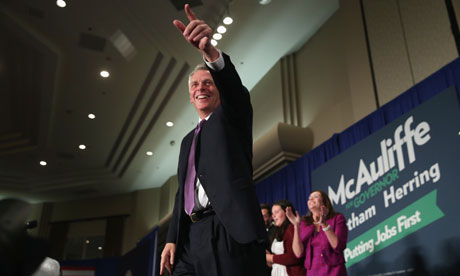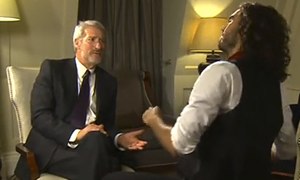Chris Christie used his decisive re-election to the governorship of New Jersey to present himself to American voters as a politician devoted to finding common ground between warring factions, in a move that put him at the heart of the debate for Republicans hoping to take back the White House in 2016.
On an election night peppered with lessons around the US for Republicans considering their future strategy, Christie made no attempt to disguise his belief that his victory in a predominantly Democratic state, in which he drew substantial support from moderate and independent voters, carried a message of relevance on the national stage.
"I know that if we can do this in Trenton, New Jersey, maybe the folks in Washington should tune into their TV sets," he said. "I know tonight, a dispirited American angry with their dysfunctional government in Washington will look to New Jersey and say: 'Is what I think happening really happening? Are people coming together?'"
Christie made no direct mention of any ambitions in the 2016 presidential race, though one woman in the crowd shouted out: "Chris Christie for president!" He quipped back: "I guess there is open bar tonight, huh? Welcome to New Jersey."
• Democrat Terry McAuliffe elected governor of Virginia
• Bill de Blasio wins landslide victory in New York mayoral vote
• Detroit elects first white mayor since 1974 amid bankruptcy crisis
With 83% of counties reporting, he had a resounding lead with 60% of the vote to 39% for his Democratic rival, the state senator Barbara Buono who he out-spent by more than five-to-one.
His landslide victory and the simultaneous defeat of Ken Cuccinelli, the more conservative Republican candidate for governor in Virginia, will embolden those within the party calling for a shift toward more centrist policies.
Christie has made a virtue of working with Democrats such as president Obama on bipartisan issues – a stark contrast to the hardliners in Congress who were blamed by voters on Tuesday for causing the government shutdown. He is also seen as much less divisive on social issues such as abortion and gun control.
In the race to secure his party's presidential nomination in 2016, the New Jersey governor will now be seen as a serious challenger to conservatives such as senators Marco Rubio and Rand Paul – both of whom campaigned unsuccessfully for Cuccinelli.
Nevertheless, many in the GOP will point to New Jersey as an outlier state and were already clinging to the narrowness of Cuccinelli's defeat to McAuliffe in Virginia on Tuesday as a reason to stick with the party's rightward tilt.
 Democrat Terry McAuliffe celebrates winning the Virginia governorship at an election night party in Tysons Corner, Virginia. Photograph: Alex Wong/Getty Images
Democrat Terry McAuliffe celebrates winning the Virginia governorship at an election night party in Tysons Corner, Virginia. Photograph: Alex Wong/Getty Images
There has been renewed interest in Christie as a possible way out for the Republicans from the virulent in-fighting that has been tearing at the party under the influence of the Tea Party. The governor made particular mention of the work he had done on the campaign trail attempting to appeal to African American and Latino voters.
Reince Priebus, chairman of the Republican National Committee, was quick to jump on the Christie bandwagon, hailing his re-election as a sign of the popularity of conservative principles "even in a state the pundits like to call a 'blue state'." Priebus made a particular point of congratulating the New Jersey governor for having attracted significant support among minority voters – claiming some of the credit for such success on behalf of the national party.
"During this race, the RNC worked alongside the Christie campaign to engage early and often with Hispanic, African American and Asian voters," he said.
Despite the RNC's response, some of the exit polls may give the party's – and Christie's – advisers some pause. Among black voters, the governor attracted just 20% support, exit polls suggested – nothing like the 93% landslide Barack Obama enjoyed nationally among African American voters in 2012.
Among Hispanics, Christie fared better at 48%, according to exit polls – tied with Buono. That's an improvement on Mitt Romney's miserable performance among Latinos in the 2012 presidential race at 27%, but shows that the Republican party still has a way to go in rebuilding Hispanic trust following years in which the general tone of Republican debate has been sharply anti-immigration.
More convincingly, and more in tune with the bridge-builder image that Christie has tried to cultivate, exit polls had the governor attracting the support of almost two thirds of independent voters – an important figure given the party's difficulties in recent elections to appeal to moderates. He won over even a third of Democratic voters – a sign of his soaring popularity since Hurricane Sandy when he was seen embracing President Obama amid the ruins of the New Jersey coastline.
The supporters who gathered at the Asbury Park convention hall to celebrate with the governor were in ebullient mood. Christina Rooney from nearby Bradley Beach said the night was "a big step to the next big step. It was a huge deal when a Republican won the governor's race in New Jersey, but re-election is even better because it shows that his bi-partisanship works."
Leo Sugg said the victory would encourage Christie to go forward with his national aspirations. He said the governor's talents would play well across the country: "He's very clear, honest and frank about the issues as he sees them. There's no ambiguity, and that's refreshing."
In his victory speech, Christie invoked what he called the "spirit of Sandy" and the impact that the storm had had on his term as governor. "It's no longer a job for me, it's a mission, it's a sacred trust. I will not let anyone, any political party, any governmental entity get between me and the completion of my mission," he said.
One of Christie's earliest challenges, should he stand in 2016, is whether he can win the hearts of hard-core Republican voters who dominate at the primary stage when Christie would be battling to represent his party as presidential candidate. Traditionally, Republican presidential candidates are forced to pitch starkly to the right during the primary, then try and scratch their way back to center ground in the general presidential election.
The Tea Party could play an influential role in deciding Christie's fate on the national stage, given its influence in many key presidential primary states. Even here though, there are signs that Christie might find favour.
Sal Russo, chief strategist of the Tea Party Express, told the Guardian that on fiscal policies and the national debt on which the Tea Parties were focused, the New Jersey governor scored well. "On the issues that we care about, Christie does pretty good – he's solid on the economy."
Contrary to much media coverage, Russo said, the Tea Party movement was very open to ideas of compromise as espoused by Christie. "It's all about getting things done, and I'm totally supportive of his efforts to reach out to non-traditional Republican constitutions. That's the right thing to do."

















